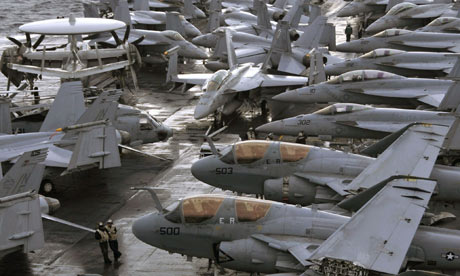
Japan and the US began their biggest-ever joint military exercise today, as South Korea warned it would carry out air strikes against North Korea if the regime repeated its attack on Yeonpyeong.
Kim Kwan-jin, expected to be named Seoul's new defence minister at the weekend, said any provocation from the North would be met with immediate retaliation. "In case the enemy attacks our territory and people again, we will thoroughly retaliate to ensure that the enemy cannot provoke again," he said.
In a move that may ease tensions, the South's defence ministry said live-fire drills due to take place near the island, which lies south of the countries' maritime border in the Yellow Sea, would be postponed until Kim takes office.
Yonhap news agency quoted a senior ministry official as saying the drills could be held "by the end of this year at the latest".
Codenamed Keen Sword, the operation between Japan and the US involves 60 ships, 500 aircraft and 44,000 troops. The drills, taking place in southern Japanese waters, are being held to mark the 50th anniversary of the countries' security alliance, but they also seen as demonstration of Washington's commitment to its ally and its ability to project military force in the region.
The eight days of manoeuvres began as the UN voiced "great concern" about North Korea's uranium enrichment programme, and warned that the regime may be hiding more nuclear facilities.
This week, North Korea boasted that it was operating thousands of centrifuges at a new uranium enrichment plant at its main nuclear complex in Yongbyon.
Last month, a leading US scientist said he had seen evidence of extraordinary advances in the regime's enrichment capabilities during a tour of the facility.
The news has heightened fears that the regime may be able to produce weapons-grade uranium, despite its claims that the material is intended solely for power generation.
Pyongyang is already believed to have enough fissile material to make a dozen nuclear weapons. Despite conducting two nuclear tests, in 2006 and 2009, North Korea has yet to prove that it had produced a viable weapon.
"These developments … are a clear manifestation of the risks posed by North Korea's defiance of its international obligations and commitments," the US envoy Glyn Davies told a meeting of the International Atomic Energy Agency [IAEA] in Vienna.
IAEA officials believe Pyongyang's enrichment activities had begun before April last year, when the UN body's inspectors were last permitted to visit the country.
"If so, there is a clear likelihood that [it] has built other uranium enrichment-related facilities in its territory," Davies said.
The IAEA's director-general, Yukiya Amano, voiced "great concern" over the reports, and called on Pyongyang to allow inspectors to return to verify the claims.
Japan, the US and South Korea have rejected Chinese calls for an emergency meeting of countries involved in multilateral talks to end North Korea's nuclear weapons programme.
Instead, the three countries will meet in Washington on Monday to discuss a unified response to the attack and the revelations about Pyongyang's nuclear programme.
China said it would keep a "close watch" on the meeting. "As the situation on the Korean peninsula is highly complicated and sensitive, we expect the meeting to ease tensions and promote dialogue, rather then heighten tensions and intensify confrontation," said Jiang Yu, a foreign ministry spokeswoman.
The US secretary of state, Hillary Clinton, who will meet her Japanese and South Korean counterparts in Washington, said efforts were being made to work with Russia and China to prevent the crisis from growing.
"North Korea poses an immediate threat to the region around it, particularly to South Korea and Japan, and a medium-term threat, should it collapse, to China," Clinton said.

Japanese self-defense force personnel chat with a US air force media officer (2nd R) after the 2011 Keen Sword C-130 media flight at the US Yokota airbase in Tokyo, on December 6, 2010. Japan and the US launched their biggest ever joint military exercise December 3 in a strident display of firepower featuring tens of thousands of personnel, hundreds of aircraft and 60 warships.


